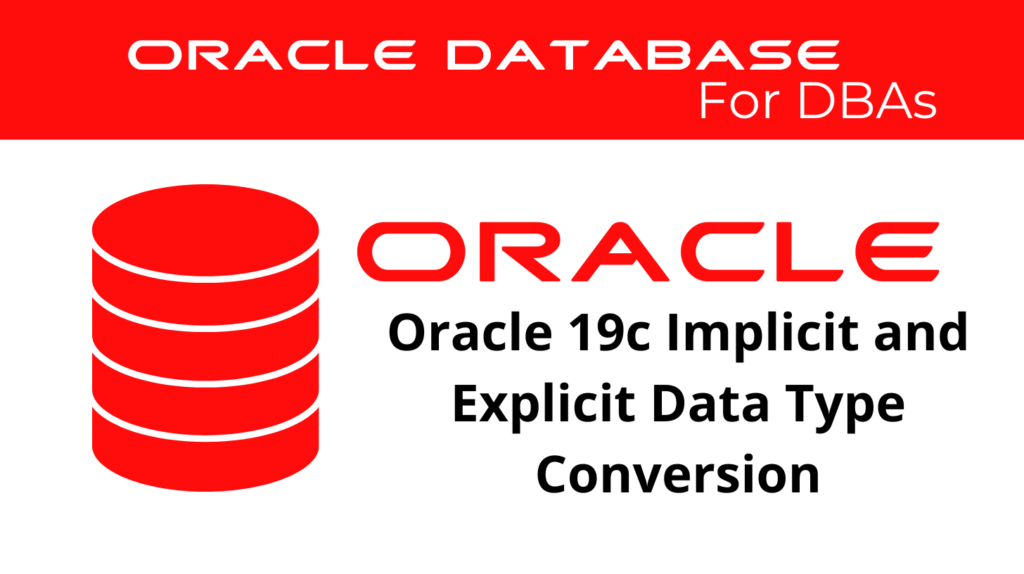
Data type conversion is an essential feature in Oracle databases, ensuring seamless interaction between different data types during operations and queries. Understanding and applying the correct type of conversion can significantly impact performance, security, and the accuracy of data manipulations. This guide focuses on the specifics of implicit and explicit data type conversions in Oracle, providing practical insights for developers and database administrators.
Introduction to Oracle Data Type Conversion
Data type conversion refers to transforming a value from one data type to another to enable operations or comparisons that involve different types. Oracle Database provides two primary forms of data conversion: implicit and explicit. While implicit conversions happen automatically, explicit conversions require the developer to define the transformation process. Both types play a significant role in database management, but their application and impact vary depending on the use case.
Implicit conversions, although convenient, can introduce hidden performance issues and errors. Explicit conversions, on the other hand, grant developers precise control over the conversion process, resulting in more predictable and efficient operations. Understanding the differences and applying the appropriate conversion method is crucial for database administrators and developers.
Implicit Conversions in Oracle
Implicit conversions occur automatically when Oracle detects a mismatch between data types. For example, if a query compares a string with a number, Oracle converts the string to a number internally to perform the comparison. While this feature simplifies coding, it often comes with hidden costs.
📢 You might also like: Oracle 19c Using the TO_CHAR, TO_NUMBER, and TO_DATE Conversion Functions (Category: Oracle Database Admin)
Example of Implicit Conversion
Consider a scenario where a query compares a VARCHAR2 value with a NUMBER column:
SELECT *
FROM employees
WHERE employee_id = '101';
In this case, Oracle converts the string ‘101’ into a number to match the data type of the employee_id column. Although the query executes successfully, the implicit conversion may prevent the database from using an index on the employee_id column, leading to a full table scan.
Challenges of Implicit Conversions
- Performance Impact: Implicit conversions can lead to suboptimal query plans by bypassing indexes and increasing the workload on the database.
- Logic Errors: Implicit conversions rely on default settings, which can change over time or between environments, causing unpredictable behavior.
- Security Risks: Implicit conversions expose applications to SQL injection vulnerabilities, especially when handling user inputs.
Avoiding Implicit Conversion Issues
To mitigate the challenges associated with implicit conversions, follow these best practices:
- Use Explicit Conversions: Replace implicit conversions with explicit functions like
TO_NUMBER,TO_CHAR, orTO_DATE. - Employ Bind Variables: Ensure parameter values match the data type of the target column to prevent unnecessary conversions.
- Validate Input Types: Use input validation to ensure values align with the expected data types.
Explicit Conversions in Oracle
Explicit conversions require the developer to define the transformation process using Oracle’s built-in functions. These conversions provide clarity, improve query performance, and reduce the likelihood of errors.
Common Functions for Explicit Conversion
Oracle offers several functions for explicit data type conversions, including:
- TO_CHAR: Converts numbers or dates into strings.
Example:SELECT TO_CHAR(sysdate, 'YYYY-MM-DD') AS formatted_date FROM dual; - TO_NUMBER: Converts strings into numbers.
Example:SELECT TO_NUMBER('12345') AS numeric_value FROM dual; - TO_DATE: Converts strings into date values.
Example:SELECT TO_DATE('2023-12-01', 'YYYY-MM-DD') AS date_value FROM dual; - CAST: Converts values to a specified data type.
Example:SELECT CAST('2023-12-01' AS DATE) AS cast_date FROM dual;
Benefits of Explicit Conversions
Explicit conversions offer several advantages over implicit conversions:
- Improved Query Performance: By eliminating unnecessary transformations, explicit conversions enable the database to leverage indexes effectively.
- Increased Clarity: Explicitly defining conversions makes the code easier to understand and maintain.
- Reduced Errors: Explicit conversions eliminate ambiguity, ensuring consistent behavior across different environments.
Best Practices for Data Type Conversion
To maximize the efficiency and reliability of your database operations, consider the following best practices:
- Minimize Implicit Conversions: Use explicit functions to define data transformations clearly and avoid unexpected behavior.
- Optimize Query Performance: Ensure data types in queries match the column definitions to enable efficient indexing.
- Use Bind Variables: Prevent implicit conversions by using bind variables with the correct data type.
- Validate Data Inputs: Perform input validation to ensure values conform to the expected types before executing queries.
Handling Common Scenarios in Data Conversion
Comparing Different Data Types
When comparing values of different data types, always use explicit conversion functions to avoid performance issues and ensure predictable results. For example, if you need to compare a VARCHAR2 column with a NUMBER value, convert the VARCHAR2 value to a number explicitly:
SELECT *
FROM employees
WHERE TO_NUMBER(employee_id) = 101;
Inserting and Updating Data with Conversions
When inserting or updating data, ensure the values match the target column’s data type. Use explicit conversion functions to transform the data as needed. For instance:
INSERT INTO employees (employee_id, hire_date)
VALUES (TO_NUMBER('123'), TO_DATE('2023-12-01', 'YYYY-MM-DD'));
Converting Large Data Sets
For large data sets, use batch processing techniques and explicit conversion functions to minimize resource consumption and improve performance.
Conclusion
Oracle 19c provides robust tools for handling implicit and explicit data type conversions, enabling seamless compatibility between different data types. While implicit conversions offer convenience, they often come with hidden costs, including performance degradation and security risks. Explicit conversions, on the other hand, grant developers precise control, improving query efficiency and reducing errors.
By understanding the nuances of data type conversions and following best practices, you can optimize your database operations, enhance performance, and ensure the integrity of your data. Whether you’re managing a small database or a large enterprise system, mastering data type conversions is essential for effective database administration and development.
See more on Oracle’s website!
Be Oracle Database Certified Professional, this world is full of opportunities for qualified DBAs!





